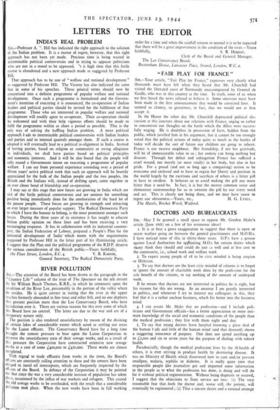"FAIR PLAY FOR FRANCE"
gm—Your article, "Fair Play for France," expresses very clearly what thousands must have felt when they heard that Mr. Churchill had visited the liberated coast of Normandy unaccompanied by General dc Gaulle, who was in this country at the time. In truth, some of us when we first heard the news refused to believe it. Some omission must have been made in the first announcement that would be corrected later. It seemed so clumsy, so gratuitous, in fact, that we would not at first accept it.
In the House the other day Mr. Churchill deprecated political dis- cussion at this juncture about our relations with France, urging us rather to concentrate our thoughts on the battle which the Allies were success- fully waging. He is doubtless in possession of facts, hidden from the public, which justified him in his argument, but it cannot be too strongly
stated that the political actions of today quite as much as the battles of today will decide the sort of future our children are going to inherit. France is our nearest neighbour. Her friendship, if not her gratitude, will be of immeasurable value to us ; her enmity can bring nothing but disaster. Through her defeat and subjugation France has suffered a cruel wound, not merely (or most vitally) in her body, but also in her pride. For a proud (and not so long ago a conquering) nation to be overcome and enslaved and to have to regain her liberty and position in the world largely by the exertions and sacrifices of others is a bitter pill to have to swallow. It behoves us to avoid making the pill any more bitter than it need be. In fact, it is but the merest common sense and elementary statesmanship for us to sweeten the pill by our every word and act. This is clearly not being done, and we may have cause to
regret our obtuseness.—Yours, etc., H. G. LYALL. The Hazels, Bricket Wood, Watford.






















 Previous page
Previous page